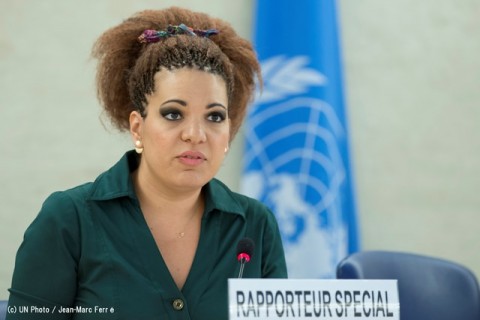Sri Lanka: UN expert calls for establishment of Independent Commission on Minorities
October 20, 2016
 UN Special Rapporteur on minority issues, Rita Izsák-Ndiaye, concluded her mission to Sri Lanka on 20th October 2016. In her end of the mission statement
UN Special Rapporteur on minority issues, Rita Izsák-Ndiaye, concluded her mission to Sri Lanka on 20th October 2016. In her end of the mission statement ![]() , she recommended the Government of Sri Lanka to establish an Independent Commission on Minorities under the Constitution which can conduct:
, she recommended the Government of Sri Lanka to establish an Independent Commission on Minorities under the Constitution which can conduct:
- reviewing and proposing domestic standards and providing expertise and information to legislation drafting and policy-making processes;
- monitoring laws and policies with respect to minority rights and recommending amendments or implementation measures;
- encouraging and coordinating programming on minority issues and strategies devised to address problems relating to minorities;
- promotion and education activities;
- developing good practice guides, information resources and reports;
- developing campaigns and outreach relating to minority rights;
- forming a bridge between minority communities and public administration; and
- facilitation of arbitration, dialogue, national debate and activities to prevent and find solutions to ethnic or religion-based tensions.
Key issues and groups during her mission:
- Inclusive governance and effective participation;
- Linguistic rights;
- Freedom of religion or belief and religious identity;
- Reconciliation process including land, security-related detainees, Prevention of Terrorism Act (PTA) and demilitarization;
- Internally displaced persons (IDPs);
- Plantation Tamils;
- Smaller minority groups (Burghers, Malays, Sri Lankan Africans and Veddas, Telugus);
- Minority women.
The Special Rapporteur also provided a series of short-term and long-term recommendations to the Government of Sri Lanka in order to address discrimination and human rights violations faced by national, ethnic, religious and linguistic minorities in Sri Lanka.
Short-term recommendations, to be implemented as soon as possible:
- Begin taking necessary steps towards the establishment of an independent, dedicated minority rights mechanism in charge of coordinating minority issues, with the inclusion of representatives of minority communities.
- Ensure full protection of all minority places of worship as well as heritage.
- Ensure that the imminent constitutional reform includes a strong minority rights regime including a fully empowered Independent Commission.
- Extend full institutional cooperation to, and strengthen the existing independent institutions and ensure sufficient human and financial resources are provided for the full implementation of their mandates, including the National Human Rights Commission, the Office for National Unity and Reconciliation and the Secretariat for Coordinating Reconciliation Mechanisms.
- Repeal and replace the Prevention of Terrorism Act with anti-terrorism legislation in conformity with international standards.
- Review all cases of security-related detainees with a view to their swift release if there are no elements that would merit a prosecution or alternatively charge those against whom there is evidence of involvement in serious crimes.
- Continue the gradual release to the civilian populations of the remaining 6,124 acres (according to the Army figures) of the land currently held by the military in the Northern province.
- Take the necessary measures to implement the recommendations of the Special Rapporteur on the human rights of internally displaced persons following his visit to Sri Lanka in December 2013, without further delay.
- Ensure the smooth and transparent process of establishment of the Office of Missing Persons by January 2017 with adequate budget and inclusive composition.
- Publicly condemn religious intolerance and hold perpetrators of hate crimes and violence accountable.
- Consider establishing a system of community liaison officers, to be placed in every public institution, with the necessary resources required to fulfil their mandate.
- Continue and step up psychosocial assistance programs to victims of the conflict according to their needs.
- Consider a review of all personal laws, especially the 1951 Muslim Marriage and Divorce Act, in line with international human rights standards and in consultation with the Muslim community including Muslim women’s groups.
Longer-term objectives with appropriate planning:
- Step up measures and allocate sufficient budget to ensure the implementation of language policy;
- Ensure that any future electoral reform ensures proportional representation for all minority groups on the basis of accurate data collection and disaggregation;
- Consider establishing affirmative action policies for under-represented communities in the government, the judiciary, armed forces and law enforcement, along ethnic, religious, linguistic as well as gender lines.
- Ensure multiple identity choice in the census and include options for smaller minorities to adequately self-identify themselves, collect and analyse data disaggregated by ethnicity, religion or language which will form a basis of appropriate policy-planning through targeted means if necessary.
- Form a vision for the reform of educational institutions to better foster friendship among children from different backgrounds and review the curriculum to ensure learning about each other’s culture, traditions, languages, and ethnicity.
Related Content

Newsletter E-CONNECT No.40 is out

Newsletter E-CONNECT No.39 is out

Newsletter E-CONNECT No.38 is out


